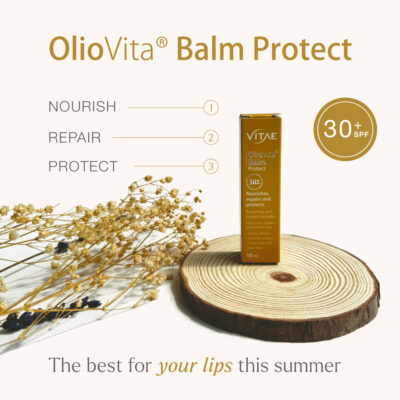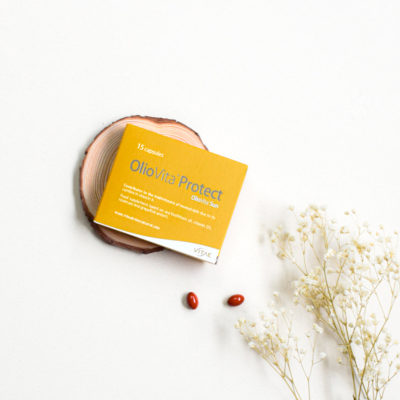Sun allergy is an increasingly common reaction that affects the skin after exposure to sunlight, especially during spring and summer. Many people confuse it with a simple sunburn, but it can actually hide a more complex problem that deserves attention. If you’ve ever noticed redness, itching, or discomfort after sun exposure, you may be experiencing this type of reaction. In this article, we explain what sun allergy is, its main symptoms, and how to protect yourself with natural products that effectively care for your skin. Curious to learn more? Keep reading to discover everything you need to stay protected from the sun in a natural and safe way.
What Is Sun Allergy and How It Affects the Skin
Sun allergy is an abnormal skin reaction that appears after exposure to sunlight. It typically manifests as redness, itching, inflammation, or small bumps, especially on areas like the chest, arms, or shoulders, and usually occurs between 30 minutes and two hours after sun exposure.
The most common form of sun allergy is polymorphous light eruption (PMLE), frequent in spring and among fair-skinned individuals. Other variants include solar urticaria, which causes hives shortly after exposure. In some cases, this allergic reaction may be triggered by the use of photosensitizing cosmetics or medications.
Types of Sun Allergy and Their Symptoms
There are different types of sun allergy, each with specific characteristics that are helpful to identify early. Although all are forms of sun-induced dermatitis, they vary in symptoms, duration, and severity. The table below helps distinguish them easily:
| Type of Sun Allergy | Main Symptoms | Approx. Duration | Severity |
|---|---|---|---|
| Polymorphous light eruption | Sun bumps, itching, redness | Days to one week | Mild to moderate |
| Solar urticaria | Immediate hives, burning sensation | Minutes to few hours | Moderate to severe |
| Photoallergy (chemical) | Sun rash, peeling, inflammation | Days (may worsen) | Moderate |
| Phototoxic reaction | Intense redness, blisters | Several days (like burn) | Moderate to severe |
Here’s a quick explanation of the main types:
Polymorphous Light Eruption (PMLE)
The most common sun allergy. Appears as small sun-induced bumps, often itchy and red. Mostly affects young women and fair skin types, typically in spring. Symptoms improve with sun avoidance and soothing skincare.
Solar Urticaria
Less common but more intense. Causes painful, swollen hives shortly after exposure, especially on the face, neck, and arms. It’s a fast reaction that may disappear in hours but tends to recur.
Photoallergy (from Cosmetics or Medications)
A sun-induced dermatitis triggered by photosensitizing substances. The body reacts to sunlight as if allergic to the product, resulting in rash, inflammation, and sometimes peeling. It appears hours after sun exposure.
Phototoxic Reaction
Although not technically an allergy, this sun reaction occurs when skin comes into contact with certain products that cause cell damage when exposed to sunlight. It resembles a burn: redness, pain, even blisters.
Causes of Sun Allergy: Why It Happens
The causes of sun allergy aren’t always easy to pinpoint, as they vary from person to person. However, several factors increase the likelihood of developing a photoallergic or phototoxic reaction when exposed to UV radiation. These are the most common triggers:
-
Genetic predisposition: People with fair skin or a family history of sun sensitivity are more prone to sun-related skin conditions.
-
Photosensitizing medications: Antibiotics (like tetracyclines), anti-inflammatories (ibuprofen, ketoprofen), and some contraceptives can trigger photoallergic reactions when combined with sunlight. Always read the leaflet or consult your pharmacist.
-
Cosmetics and perfumes: Ingredients such as alcohol, citrus essential oils, or certain preservatives can trigger phototoxic reactions, even after brief exposure.
-
Autoimmune or dermatological conditions: Lupus, rosacea, or eczema can heighten sun sensitivity.
-
Sudden or prolonged sun exposure: Going from low to intense sun exposure, such as at the start of summer, can trigger a defensive skin reaction.
-
Age and hormonal changes: Young skin and skin undergoing hormonal changes (pregnancy, menopause) tend to react more easily.
How to Know If You Have a Sun Allergy
Identifying a sun allergy can be tricky, as it’s often mistaken for a sunburn or irritation. However, some key signs can help you spot it. If you experience itching, bumps, or redness after sun exposure—especially on areas like the chest, arms, or face—you might be dealing with a sun allergy.
Here’s a quick checklist to help you decide whether to consult a specialist:
-
Bumps, rash, or hives appear shortly after sun exposure.
-
You feel intense itching or burning on exposed skin.
-
Symptoms occur repeatedly after each sun exposure.
-
The rash appears on usually covered areas.
-
You used medications or cosmetics before exposure.
-
The reaction lasts several days or gets worse.
If several of these apply to you, it’s best to visit a dermatologist. They can confirm whether it’s a photoallergic or phototoxic reaction and recommend the most suitable treatment for your skin.
What to Do If You Have a Sun Allergy: Tips and Prevention
Wondering what to do if you have a sun allergy? While it can’t be completely cured, flare-ups can be minimized, symptoms soothed, and skin protected so you can safely enjoy the sun. Here are the best habits to help prevent reactions:
7 Tips to Avoid Sun Allergy:
-
Avoid intense sun exposure, especially between 12:00 and 16:00, when UV radiation is strongest.
-
Protect your skin with light clothing, wide-brimmed hats, and UV-filter sunglasses.
-
Apply broad-spectrum sunscreen (SPF 50+) every 2 hours, even on cloudy days.
-
Keep your skin well-hydrated before and after sun exposure using soothing products like aloe vera or calendula.
-
Talk to your doctor or pharmacist if you’re taking photosensitizing medications (antibiotics, anti-inflammatories, etc.).
-
Avoid perfumes and cosmetics with alcohol or citrus oils, as they can trigger photoallergic reactions.
-
Add antioxidants to your daily routine, such as vitamin C, beta-carotene, or coenzyme Q10, to help strengthen your skin from within.
What to Do at the Beach or Outdoors If You Have Photosensitive Skin
If your skin is photosensitive, schedule outdoor activities for early morning or late afternoon. Seek natural shade, stay hydrated, and reapply sunscreen after every swim. If you notice itching, redness, or rash, get out of the sun immediately and apply a soothing cream. If symptoms persist, consult a dermatologist.
Oliovita Protect: Natural Oral Photoprotection for Sun Allergy
In addition to specific creams, more dermatologists now recommend complementing topical protection with oral photoprotection for sun allergy. This internal support strengthens the skin’s natural defenses against UV rays, helping prevent reactions like redness, bumps, or itching.
A standout option among natural sun protection supplements is Oliovita Protect, a dietary supplement made from plant-based ingredients rich in antioxidants and skin-protecting compounds.
What Are the Benefits of Oral Photoprotection?
-
Deep skin hydration thanks to essential fatty acids.
-
Antioxidant boost to fight UV-induced oxidative stress.
-
Cutaneous immune support, helping reduce rashes, spots, and sun discomfort.
-
Complement to topical sunscreen, working synergistically for more complete protection.
These sun allergy capsules are especially useful for people with photosensitive skin, a history of sun-related dermatitis, or those planning extended sun exposure (vacations, outdoor activities, etc.).
Frequently Asked Questions About Sun Allergy
If you’ve identified with some of the symptoms or situations mentioned above, it’s natural to have questions. Here are clear answers to the most frequently asked ones:
How Long Does Sun Allergy Last?
Symptoms usually appear between 30 minutes and several hours after exposure, lasting between 1 and 5 days. Duration depends on the reaction’s intensity, skin type, and how quickly soothing measures are applied.
Can You Be in the Sun if You Have a Sun Allergy?
Yes, but with precautions. Avoid peak sun hours, use physical sunscreen and protective clothing. Oral photoprotection is also recommended, and gradually increase sun exposure over time.
Does Sun Allergy Go Away Over Time?
In some cases, symptoms may lessen with gradual sun exposure (acclimatization). However, some people experience it chronically and need to maintain consistent protection routines.
If you have further concerns, speak with a dermatologist. They can assess your situation and help you find the best treatment or prevention strategy.
Conclusion: Enjoy the Sun Without Fear of Allergy
Having photosensitive skin doesn’t mean giving up summer. With a proper dermatological diagnosis, the right sun allergy cream, and support from a natural oral photoprotector like Oliovita Protect, you can enjoy the sun safely—even with an allergy.
The key is to prevent solar reactions with conscious habits: avoid direct exposure during peak hours, hydrate your skin daily, check your products before going out, and enhance your skincare with antioxidants that strengthen your skin from within.
This summer, give your skin what it needs—and feel free under the sun.






